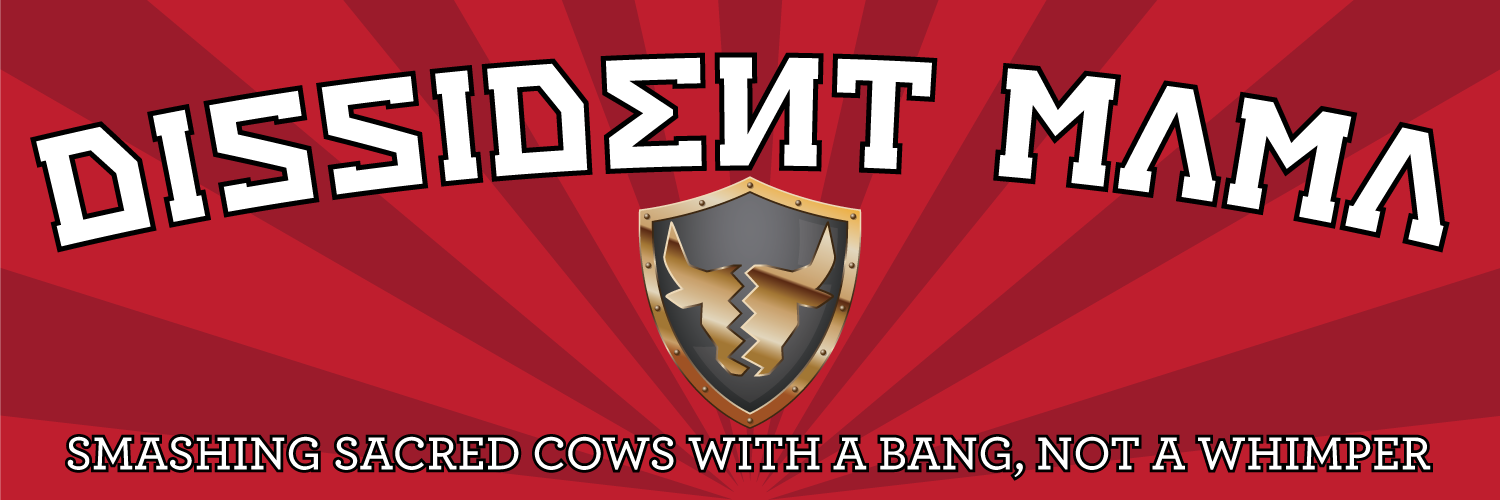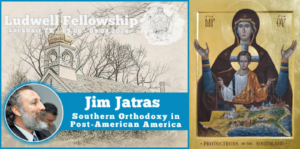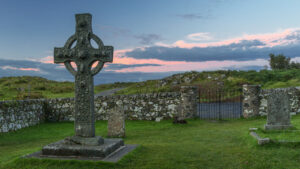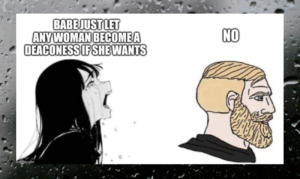By Walt Garlington
I.
Man understands intuitively that he was made to transcend the boundaries that the Fall has placed upon him, that he was made for a real union with the things around him. This is expressed in a variety of ways. The French mystical philosopher Simone Weil said, “We want to get behind [beauty]. … We should like to feed upon it, but it is merely something to look at … The great trouble in human life is that looking and eating are different operations. Only beyond the sky, in the country inhabited by God, are they one and the same operation” (The Simone Weil Reader, p. 475, quoted in Vigen Guroian, The Fragrance of God, William B. Eerdmans Publishing Co., Grand Rapids, Mich., 2006, pgs. 75-6). Hindus have their belief in the soul’s absorption into the eternal brahman after she achieves liberation from the material world. Even atheistic transhumanists like Ray Kurzweil desire to unite the minds of people – using rather unsavory methods, however, like nanorobotic implants.
II.
The Orthodox Church has taken this innate desire of man and freed it from all the distortions to which it has been subjected over the millennia of his life on earth, revealing man’s true end as theosis. Mark Shuttleworth gives a short overview of this concept:
I said, “You are gods,
And all of you are children of the Most High.” (Psalm 82:6)
This is a verse that most Protestants do not underline in their Bibles. What on earth does it mean—“you are gods”? Doesn’t our faith teach that there is only one God, in three Persons? How can human beings be gods?
In the Orthodox Church, this concept is neither new nor startling. It even has a name: theosis. Theosis is the understanding that human beings can have real union with God, and so become like God to such a degree that we participate in the divine nature. Also referred to as deification, divinization, or illumination, it is a concept derived from the New Testament regarding the goal of our relationship with the Triune God. (Theosis and deification may be used interchangeably. We will avoid the term divinization, since it could be misread for divination, which is another thing altogether!)
Many Protestants, and even some Roman Catholics, might find the Orthodox concept of theosis unnerving. Especially when they read a quote such as this one from St. Athanasius: “God became man so that men might become gods,” they immediately fear an influence of Eastern mysticism from Hinduism or pantheism.
But such an influence could not be further from the Orthodox understanding. The human person does not merge with some sort of impersonal divine force, losing individual identity or consciousness. Intrinsic divinity is never ascribed to humankind or any part of the creation, and no created thing is confused with the being of God. Most certainly, humans are not accorded ontological equality with God, nor are they considered to merge or co-mingle with the being of God as He is in His essence.
In fact, to safeguard against any sort of misunderstanding of this kind, Orthodox theologians have been careful to distinguish between God’s essence and His energies. God is incomprehensible in His essence. But God, who is love, allows us to know Him through His divine energies, those actions whereby He reveals Himself to us in creation, providence, and redemption. It is through the divine energies, therefore, that we achieve union with God.
We become united with God by grace in the Person of Christ, who is God come in the flesh. The means of becoming “like God” is through perfection in holiness, the continuous process of acquiring the Holy Spirit by grace through ascetic devotion. … Fr. David Hester, in his booklet, The Jesus Prayer, identifies theosis as “the gradual process by which a person is renewed and unified so completely with God that he becomes by grace what God is by nature.” Another way of stating it is “sharing in the divine nature through grace.”
St. Maximos the Confessor, as Fr. Hester notes, defined theosis as “total participation in Jesus Christ.” Careful to maintain the ontological safeguard noted above, St. Maximos further stated, “All that God is, except for an identity in being, one becomes when one is deified by grace.”
With the Incarnation, God has assumed and glorified our flesh and has consecrated and sanctified our humanity. He has also given us the Holy Spirit. As we acquire more of the Holy Spirit in our daily lives, we become more like Christ, and we have the opportunity of being granted, in this life, illumination or glorification. When we speak of acquiring more of the Holy Spirit, it is in the sense of appropriating to a greater degree what has actually been given to us already by God. We acquire more of what we are more able to receive. God the Holy Spirit remains ever constant.
Certain consequences follow from this truth of a real union between God and His creation, and the life lived in accordance with that truth in the Orthodox Church.
First, one will notice that, for the Orthodox, the images of God as Creator and Cultivator and the creation as a garden have not diminished. In the hymns of the Orthodox Church, one continually finds among them those such as this kontakion for Saturday: “The universe offers the God-bearing martyrs as the first-fruits of nature, to Thee, O Lord the Gardener of Creation. Through the Theotokos and their prayers preserve Thy Church, Thy habitation, in abiding peace, O Greatly-merciful One” (Orthodox Daily Prayers, 2nd edn., S. Arhipov edr., St. Tikhon’s Seminary Press, South Canaan, Pennsylvania, 2008, p. 53).
St. Nikodemos of Mt. Athos extends this line of thought in the introduction to his collection of the lives of the saints:
This Synaxaristes should rightfully be called the diverse and fragrant Garden of Christ’s holy Church, full of Pomegranates and Dry Fruits, Spikenard and Crocus, Calamus and Hyacinthus, Narcissus and Cinnamon and of all the best and most fragrant odors and perfumes, through whose splendor and grace she sweetens, gladdens, delights and makes fragrant her own children, each according to their own order and profession. Of such was written concerning the sung about Bride: “Awake, O north wind; and come, O south; and blow through my garden, and let my spices flow out” (Songs 4:16), and again: “Let my kinsman come down into his garden, and eat the fruit of his choice berries” (Songs 5:1). In regards to this garden, it was right for Theophilos, the sixth bishop of Antioch, to write to Autolycus, that the Church is truly a Garden, in which are the Roses of Martyrs, the Lilies of Virgins, the Violets of Widows and the Ivy of the Married.
This is why Mary Magdalene, who although she erred (so to speak) did not err, and misrecognizing she did not misrecognize, when in the garden she mistook the Master Christ as the gardener. For Jesus Christ, He is the true gardener of this Garden of the Synaxaristes, and He planted within it with His almighty right hand, the many kinds and ubiquitous and diverse trees of the saints, and showed it to be incomparably better than the Asian gardens and paradises, planted by King Cyrus, and the hanging gardens of Babylon, which was one of the seven wonders of the world; or rather we should say, the whole fruit of the incarnate economy of the Word of God, and the coming of the Holy Spirit in the form of tongues of fire, which happened during the day of Pentecost, and the gain of the whole gospel, which was preached throughout the world by the holy apostles, were all the Saints, most of whom are contained in this Synaxaristes. Because of this fruit, the Lord said to the sacred apostles: “By this My Father is glorified, that you bear much fruit; so you will be My disciples” (John 15:8).
It is also seen in icons such as “Christ the True Vine.”
Second, man, with the assistance of God’s Grace and through his own spiritual labors, is able to reattain the friendship that existed between mankind and the rest of the creation prior to the Fall. St. Isaac the Syrian teaches,
The humble person approaches beasts of prey, and as soon as their gaze alights upon him, their wildness is tamed and they approach him and attach themselves to him as their master, wagging their tails and licking his hands and feet. For they smell from him the scent which wafted from Adam before his transgression, when the beasts gathered to him and he gave the names in Paradise—the scent which was taken from us and given back to us anew by Christ through His advent, for it is He who has made the smell of the human race sweet.
A number of saints manifest this recovered Grace in the Orthodox Church, from St. Blaise of Sebaste to St. Joannicius the Great to St. Seraphim of Sarov.
III.
The West long ago rejected this teaching of the union of God and man. Philip Sherrard directs us to the main point of departure: the teachings of St. Augustine on the Fall of man:
Indeed, this conception of human nature as a self-subsisting reality, with a historical existence of its own apart from the divine, is nowhere more apparent than in the thought of St. Augustine. It is apparent above all in relation to Augustine’s understanding of sin and its consequences. According to Augustine, in Adam all men have sinned. This sin is transmitted from generation to generation through the act of begetting itself. … It has deprived him completely of his participation in the divine, in the image of God, the Logos.
. . . what is important about this understanding of sin and its consequences is that it presupposes precisely the idea that human nature as such—or mankind as such—can exist and does exist as a reality independent of God, totally cut off from God. Man can and does exist deprived of grace, deprived of his participation in the divine. Indeed, this is the condition in which he was born into this world, and this is why for Augustine unbaptized children are automatically damned. What is presupposed in other words is a radical dichotomy between God and man. There is a virtually unbridgeable ontological gap between them (Church, Papacy and Schism: A Theological Inquiry, Denise Harvey, Limni, Evia, Greece, 2009, pgs. 86-8).
In opposition to this, Mr. Sherrard gives the Orthodox view, which is a condensation of what we quoted at the opening of the essay:
If all men possess as their human birthright what [St.] Justin [Martyr] calls the seed of the Logos or if, to put it another way, Christ is the archetype of mankind, then however great in one sense the difference between the absolute and the relative, the uncreated and the created, God and man, there can be no radical dichotomy or ontological gap between them. There can be no total disparity between Christ’s nature and our own. They are ultimately of the same character and the incarnation has a direct personal significance (p. 90).
Because of this ontological gap between God and man, the Church in the West ceases to be the Mystical Body of Christ Himself, in and through which men and women can be actually united with the Holy Trinity, and she becomes instead merely a legalistic, bureaucratic, earthly organization (or, worse, an invisible body) that dispenses a created form of grace:
It has become a juristic social entity. It is assimilated to the visible structure of the Church as a supra-individual collectivity with the pope at its head … it is the sense of an ontological gap existing between God and man, … which gives rise to the idea that the Church as a collective sociological and juristic corporation constitutes a mystical body in its own right. And this idea is reflected … in the idea that the various human beings called in the Church to be partakers of divine grace are united, not to the Person of Christ to form a divine-human synthesis with him, but in a non-personal union in the mystical body of the Church regarded as a divine-human entity in its own right (p. 94).
The false Roman Catholic and Protestant teaching on the double procession of the Holy Spirit (that He proceeds from both the Father and the Son, rather than from the Father alone) is implicated in this:
The notion that the Holy Spirit derives his hypostatic subsistence from the Son, as well as from the Father, and the failure to distinguish between this subsistence and the eternal manifestation of the divine nature in the Person of the Spirit, means inevitably that all his activities are seen as being in some way dependent on the Son. Within the Trinity, he acts as the link between the Son and the Father. In the Son’s redemptive mission, he is the instrument or agent of the Son, or his vicar, operating through the impersonal action of created grace. In fact, in this perspective it is difficult to visualize any energetic manifestation of the Trinity outside the essence: the determination to maintain at all costs the idea of a divine simplicity which does not admit any differentiation has become so great that everything that exists outside the essence can be regarded only as created effects or created gifts and acts of will. Glory and sanctifying grace are alike created (p. 105).
Because of these distortions, mankind and the cosmos he is a part of have taken on a negative hue. Men and women in the post-Great Schism West are only valuable as means used to achieve certain ends:
The visible Church as the Christian society with the pope at its head exists over and above all its members; and while each member can achieve significance or positive status only to the degree to which he or she participates in the corporate life of the Church, the reverse is of course not the case. It is in the corporate reality of the Christian society that the good life resides, and to share in it the individual must subject himself unreservedly to the divinely appointed functionaries that govern it and to the laws that they promulgate. Indeed, offences against these laws should be punished in the same way as heresy, for there is now no real distinction between them: both are offences against the laws of the Christian society, and it is service to or offence against the well-being of this society that distinguishes good from evil. It is the well-being of the whole of the Christian society that now defines the purpose of the individual Christian, since individual well-being can be found only in serving the community as a whole (pgs. 60-1; see also pgs. 26-7).
If one substitutes “Protestant country” or its secularized offspring, the constitutional republic/democracy with its disestablishment clauses, for the Roman Catholic “Christian society,” the end result is the same: Mankind has become an instrument.
This shows up in the statements of belief of Western denominations. Union with God is replaced with other goals. The Westminster Shorter Catechism provides a good example: “1. What is the chief end of man? Man’s chief end is to glorify God, and to enjoy Him forever.”
The physical creation, for the Western denominations, has lost its value. Because of the Fall, it has become utterly corrupted (this is discussed extensively in Philip Sherrard, The Rape of Man and Nature). The creation is thus left in a very precarious place, in which its abuse may be, and has been, easily justified in the West, where the cosmic dimension of Christ’s incarnation has been obscured.
Man and the non-rational creation have become instrumentalized in the West; they are little more tools useful to achieving some end or another – to serve the Pope, to glorify God by our salvation or by our damnation, to conduct moral crusades, and so on:
The person … is the ‘image of God’, a spiritual value, and so cannot be conscripted into a group or collectivity bound in this way to fulfill a common purpose. He cannot be a means to any end. He is his own purpose, his own end, and is unique. Every use of the person as a means to achieving some collective goal—even the most lofty collective goal—reduces him to an individual, an ego, and debases him from his status as the image of God. A relationship between persons consequently cannot be established through any outward bond or constitution. It can be established only through mutual recognition that each possesses and embodies the same inner qualities, an identical inner reality. It is this possession of inner qualities and of an identical inner reality which constitutes the basis of the relationship and the principle of unity between one person and another (Sherrard, Church, p. 26).
Narrowing our view somewhat to focus on North America, we find that the South more than the North has lived this ideal of personhood as described by Mr. Sherrard: “… Southern Evangelicals are more single-minded in being dominantly evangelistic, putting the salvation of souls as first priority; their northern counterparts are tougher, less aggressive, more demanding, and, often, more given to social responsibility” (Samuel S. Hill, Jr., The South and the North in American Religion, U of Georgia Press, Athens, Ga., 1980, p. 139) – a contrast that takes us now into a closer look at the role of the South in this drama.
IV.
The South is by no means immune from these larger currents flowing through the Western world. In this instance, however, the laymen have gotten the better of the clergy. For all his brilliance on other subjects, the Rev. Robert Lewis Dabney falls precisely in line with the mistaken notion that man and God must forever remain separate entities: “… we see nothing in the Bible to warrant the belief of a literal conjunction of the substance of the Godhead in Christ, with the substance of the believer’s soul; much less of a literal, local conjunction of the whole mediatorial person, including the humanity, with the soul” (Systematic Theology, The Banner of Truth Trust, Carlisle, Penn., 1985, p. 616).
The refrain from the Baptist hymn “In the Garden” illustrates in poetry and music that prosaic explanation from Rev. Dabney and other Southern pastors:
And He walks with me, and He talks with me,
And He tells me I am His own,
And the joy we share as we tarry there,
None other has ever known.
This is very much a limited, external relationship, akin to that between two human friends, not that between a God welcoming His creation onto a path of infinite depth and breadth and wonder and transformation.
But the farmer-philosopher and layman Wendell Berry sounds some very Orthodox notes when he writes, “We will discover that the creation is not in any sense independent of the Creator, the result of a primal creative act long over and done with, but is the continuous, constant participation of all creatures in the being of God” (“Christianity and the Survival of Creation,” The Art of the Commonplace: The Agrarian Essays of Wendell Berry, N. Wirzba edr., Counterpoint, Berkeley, Cal., 2002, p. 308).
While Mr. Berry says it explicitly in his essay, in Southern lay literature, there is often an unconscious recognition that God’s Grace is present in the creation. Margaret Junkin Preston provides a hint of this in her novel Silverwood: A Book of Memories (1856, p. 100; quote taken from archive.org), in which she describes a forest church:
Beautifully stood the antique, moss-grown church, almost hidden on its sloping knoll, among giant, white-branched sycamores, and stalwart oaks, and mountain ashes—the heroic remnants of the primeval forest, which, like the race whose council-fires they may have shaded, alone remained to give token of former glory. A stream of clear water crossed the road, just at the foot of the knoll on which this old structure, dating away back to colonial times, reared its venerable walls. A steep roof, with wide, projecting eves, windows and doors scattered about with not much reference to symmetry, an outside covered stairway, all combined to make it a most quaint-looking pile.
Beauty, antiquity, a church structure that blends and merges with the surrounding, living, giant trees – the picture drawn is that of a conduit of God’s blessings being opened into world.
And following the teaching of St. Isaac the Syrian described above, along with this one (drawn from the same source as the above quote) –
What is a merciful heart? It is a heart on fire for the whole of creation, for humanity, for the birds, for the animals … and for all that exists. By the recollection of them the eyes of a merciful person pour forth tears in abundance. By the strong and vehement mercy that grips such a person’s heart, and by such great compassion, the heart is humbled and one cannot bear to hear or to see any injury or slight sorrow in any in creation. For this reason, such a person offers up tearful prayer continually even for irrational beasts, for the enemies of the truth, and for those who harm her or him, that they be protected and receive mercy. And in like manner such a person prays for the family of reptiles because of the great compassion that burns without measure in a heart that is in the likeness of God,
some Southerners have likewise shown in intriguing ways that they were beginning to approach the pre-Fall Adamic relationship with animals.
General Lee wrote on 6 Feb. 1863 a letter to his daughter Agnes. In the midst of so many cares during the War, see where his thoughts were dwelling:
Here you will have to take me with the three stools—the snow, the rain, and the mud. The storm of the last twenty-four hours has added to our stock of all, and we are now in a floating condition. But the sun and the wind will carry all off in time, and then we shall appreciate our relief. Our horses and mules suffer the most. They have to bear the cold and rain, tug through the mud, and suffer all the time with hunger (Capt. Robert Edward Lee, Recollections and Letters of General Robert E. Lee, originally published 1904, e-book #2323 published Sept. 2000, updated 4 Feb. 2013).
Of Gen. Lee and Traveller (and of Gen Lee’s appreciation of the beauty of the creation besides) we have this note from Lee’s son:
My father’s affection for his horses was very deep and strong. In a letter written from the Springs one summer, to his clerk in Lexington, he says:
“How is Traveller? Tell him I miss him dreadfully, and have repented of our separation but once—and that is the whole time since we parted.”
I think Traveller appreciated his love and sympathy, and returned it as much as was in a horse’s nature to do. As illustrative of this bond between them, a very pretty story was told me by Mrs. S. P. Lee [Daughter of General W. N. Pendleton, Chief of Artillery of the A.N.Va., and widow of Colonel Edwin Grey Lee, C. S. A.]:
“One afternoon in July of this year, the General rode down to the canal-boat landing to put on board a young lady who had been visiting his daughters and was returning home. He dismounted, tied Traveller to a post, and was standing on the boat making his adieux, when some one called out that Traveller was loose. Sure enough, the gallant gray was making his way up the road, increasing his speed as a number of boys and men tried to stop him. My father immediately stepped ashore, called to the crowd to stand still, and advancing a few steps gave a peculiar low whistle. At the first sound, Traveller stopped and pricked up his ears. The General whistled a second time, and the horse with a glad whinny turned and trotted quietly back to his master, who patted and coaxed him before tying him up again. To a bystander expressing surprise at the creature’s docility the General observed that he did not see how any man could ride a horse for any length of time without a perfect understanding being established between them. My sister Mildred, who rode with him constantly this summer, tells me of his enjoyment of their long rides out into the beautiful, restful country. Nothing seemed to delight him so much” (Ibid.).
V.
Because of the West’s ongoing separation from the Orthodox Church, she has accepted into her bosom many destructive ideologies, heresies, etc. Dixie has avoided the worst of these because of her partial hold on some of the Orthodox Church’s truths about God, man, and the creation. But a partial acceptance won’t be enough in the long run. The falling-away from Christianity already so advanced throughout the West is now beginning its fatal work in the South. The once seemingly invincible Southern Baptist denomination has shed millions of members lately. The Presbyterian and Methodist denominations are splintering over cultural issues like LGBT. The supposedly indefectible head of the Roman Catholic Church is at war with some its most ancient liturgical and doctrinal traditions. There will be battles to fight within the Orthodox Church as well, but the difference is that the Lord Jesus Christ of the Orthodox – the true, undistorted Son and Word of God, Who is also perfect man – will keep our little Southern ship from foundering in the waves if we invite Him into it with us (St. Matthew’s Gospel 8:23-27; also depicted in iconographic form).
Walt Garlington is a chemical engineer turned writer and editor of the website Confiteri: A Southern Perspective. The feature image at top was suggested by Garlington for its use in “representing the way man has become a tool for various worldly ends, including ‘making the world safe for democracy.‘”







Comments
Rewritten in 2023, “While I slept” is an alternative to the 1946 famous poem, “First they came”
While I slept … THEY came to destroy my ethnic culture
And I did not speak out
Because I bought into THEIR DIVISIVE propaganda and lies
While I slept … THEY weakened the nations with THEIR addictions
And I did not speak out
Because I believed there was nothing I could do
While I slept … THEY came for people’s human rights and freedoms
And I did not speak out
Because I never understood what human rights were and what freedom meant
While I slept … THEY came for my livelihood and property
And I did not speak out
Because I believed I could not stand up against TYRANTS
While I slept … THEY came for the children,
My neighbors, my friends and my family
And there was no one left to speak out for me
Because I was now all alone
I did not keep watch over my loved ones
And GUARD MY NATION
This applies to all ethnicities and nations around the world!
Author
Thank you, Sandy!
so the termite and the tse tse fly? i can will them away?
or the yellow jacket nest at the base of the electric pole at the front of my yard beside a sidewalk? i have seen a young child disturb a nest….the jackets were inside his shirt stinging him over and over….his face and arms too. i destroyed the nest beside the sidewalk….they stung me on the back of my ankle as my mower disturbed them.